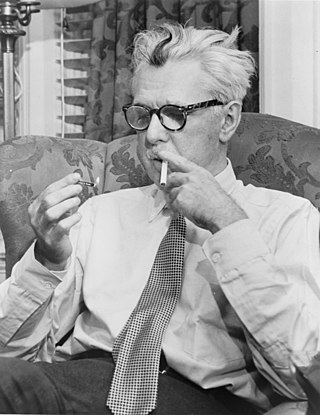
James Grover Thurber was an American cartoonist, writer, humorist, journalist and playwright. He was best known for his cartoons and short stories, published mainly in The New Yorker and collected in his numerous books.

My World ... and Welcome to It is an American half-hour television sitcom based on the humor and cartoons of James Thurber.

The Big Bad Wolf is a fictional wolf appearing in several cautionary tales, including some of Grimms' Fairy Tales. Versions of this character have appeared in numerous works, and it has become a generic archetype of a menacing predatory antagonist.

Little Red Riding Hood is a European fairy tale about a young girl and a sly wolf. Its origins can be traced back to several pre-17th-century European folk tales. The two best known versions were written by Charles Perrault and the Brothers Grimm.

Goldilocks and the Jivin' Bears is a 1944 Warner Bros. Merrie Melodies cartoon directed by Friz Freleng and produced by an uncredited Eddie Selzer. The short was released on September 2, 1944.
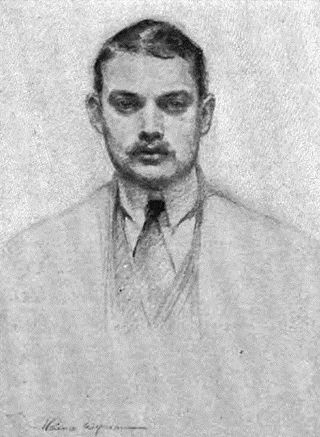
Guy Wetmore Carryl was an American humorist and poet.

The Stinky Cheese Man and Other Fairly Stupid Tales is a postmodern children's book written by Jon Scieszka and illustrated by Lane Smith. Published in 1992 by Viking, it is a collection of twisted, humorous parodies of famous children's stories and fairy tales, such as "Little Red Riding Hood", "The Ugly Duckling" and "The Gingerbread Man". The book won The New York Times Best Illustrated Book award, was a Caldecott Honor book in 1993, and has won numerous other awards in various countries.

Revolting Rhymes is a 1982 poetry collection by British author Roald Dahl. Originally published under the title Roald Dahl's Revolting Rhymes, it is a parody of traditional folk tales in verse, where Dahl gives a re-interpretation of six well-known fairy tales, featuring surprise endings in place of the traditional happily-ever-after finishes.
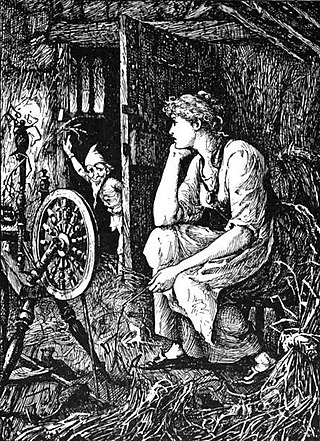
The Langs' Fairy Books are a series of 25 collections of true and fictional stories for children published between 1889 and 1913 by Andrew Lang and his wife, Leonora Blanche Alleyne. The best known books of the series are the 12 collections of fairy tales also known as Andrew Lang's "Coloured" Fairy Books or Andrew Lang's Fairy Books of Many Colors. In all, the volumes feature 798 stories, besides the 153 poems in The Blue Poetry Book.

Politically Correct Bedtime Stories: Modern Tales for Our Life and Times is a 1994 book written by American writer James Finn Garner, in which Garner satirizes the trend toward political correctness and censorship of children's literature, with an emphasis on humour and parody. The bulk of the book consists of fairy tales such as Little Red Riding Hood, the Three Little Pigs and Snow White, rewritten so that they represent what a politically correct adult would consider a good and moral tale for children.

"The Unicorn in the Garden" is a short story written by James Thurber. One of the most famous of Thurber's humorous modern fables, it first appeared in The New Yorker on October 21, 1939; and was first collected in his book Fables for Our Time and Famous Poems Illustrated. The fable has since been reprinted in The Thurber Carnival, James Thurber: Writings and Drawings, The Oxford Book of Modern Fairy Tales, and other publications. It is taught in literature and rhetoric courses.
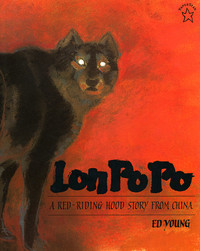
Lon Po Po: A Red-Riding Hood Story from China is a children's picture book translated and illustrated by Ed Young. It was published by Philomel in 1989 and won the 1990 Caldecott Medal for distinguished American illustrated books for children.

The Little Red Riding Hood fairy tale has often been adapted, and into a wide variety of media.

A Thurber Carnival is a revue by James Thurber, adapted by the author from his stories, cartoons and casuals, nearly all of which originally appeared in The New Yorker. It was directed by Burgess Meredith with James Starbuck serving as associate director. Following a six city tryout, during which Thurber continued to rewrite the show, it premiered on Broadway on February 26, 1960, and ran for 223 performances, with a break from June 25 to September 5. It closed on November 26, 1960. The title is similar to that of The Thurber Carnival (1945), Thurber's most successful collection of stories and drawings.
"The Rabbits who caused all the Trouble" is a short modern fable written by James Thurber. It first appeared in The New Yorker on August 26, 1939; and was first collected in his book Fables for Our Time and Famous Poems Illustrated. The fable has since been reprinted in The Thurber Carnival, James Thurber: Writings and Drawings, The Oxford Book of Modern Fairy Tales, and other publications. The story is often used in classes that teach English as a second language.

Little Rural Riding Hood is a 1949 MGM animated cartoon short subject directed by Tex Avery, conceived as a follow-up to his 1943 cartoon Red Hot Riding Hood.
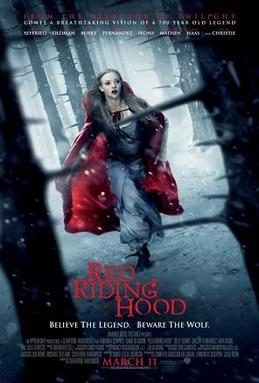
Red Riding Hood is a 2011 American romantic horror film directed by Catherine Hardwicke, and produced by Leonardo DiCaprio, from a screenplay by David Leslie Johnson. The film is very loosely based on the folk tale "Little Red Riding Hood" collected by both Charles Perrault under the name Le Petit Chaperon Rouge and several decades later by the Brothers Grimm as Rotkäppchen. It stars Amanda Seyfried as the title role, with Gary Oldman, Billy Burke, Shiloh Fernandez, Max Irons, Virginia Madsen, Lukas Haas and Julie Christie in supporting roles.

Jean de La Fontaine collected fables from a wide variety of sources, both Western and Eastern, and adapted them into French free verse. They were issued under the general title of Fables in several volumes from 1668 to 1694 and are considered classics of French literature. Humorous, nuanced and ironical, they were originally aimed at adults but then entered the educational system and were required learning for school children.

The Bear's Tale is a 1940 Warner Bros. Merrie Melodies animated cartoon short, directed by Tex Avery. The short was released on April 13, 1940, and stars the Three Bears.

Wolf in the Snow is a 2017 wordless picture book by Matthew Cordell. The book was favorably received by critics and won the 2018 Caldecott Medal. The story has drawn comparisons to fairy tales like Little Red Riding Hood. The nearly wordless book tells the story of a girl and wolf who each get lost in the snowstorm. Cordell used distinctive illustration techniques for the girl and the wolf.

















